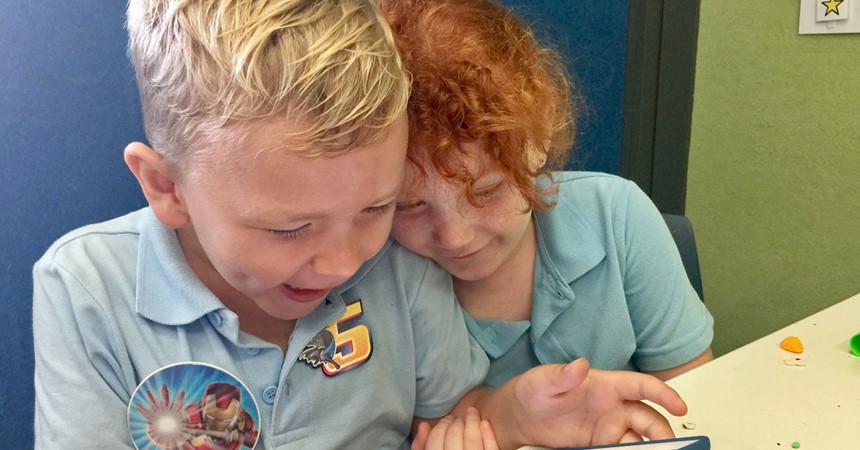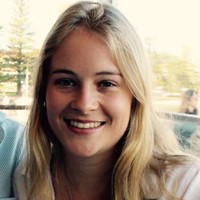Autism Spectrum Australia (Aspect) is Australia’s leading service provider for people on the autism spectrum. It is the largest autism-specific education program worldwide that offers specialised services for over 1000 children in schools every year.
“Our goal is to help students develop the skills to become as independent as possible and to enable them to succeed in the wider community. Using our own educational framework, the Aspect Comprehensive Approach for Education, we tailor our learning environment and teaching methods to the special needs of students with autism,” said Co-ordinator and Aspect Practice Specialist, Craig Smith.
Diocesan schools have a strong association with Aspect, working in collaboration with school staff to address the learning needs of students on the spectrum.
Located in Thornton, Aspect Hunter School enables children to enrol in the program at a young age and be offered an autism-specific education program to best determine suitable support options. Students may then benefit from the transition to satellite classes in local mainstream schools where they will develop core competency skills such as social development, emotional regulation and independence skills.
Aspect Hunter School provides a suite of satellite classes that cater for the individual needs of students on the autism spectrum. A satellite class is an autism-specific class that provides specialised support services and facilities. Aspect Hunter School operates these classes from local mainstream schools in the Catholic Diocese of Maitland-Newcastle and Department of Education schools.
“We use the latest teaching strategies and practices to give our students the best opportunity for educational success by tapping into their special interests and creating a curriculum uniquely focused around what motivates our students.
“We focus on creative learning experiences for our students that connect to their strong visual processing skills, their skills around physics and exploring the world around them, their interest in technology and the huge range of other unique skills with which our students present. Our students love using robotics and Lego to create solutions to problems we give them in the classroom and on the playground.
“We could not achieve the unique outcomes we do attain for our students on the autism spectrum and their families without our satellite program and the very special relationship we have with our local Catholic schools,” said Craig.
Education Officer, Rachel Jones, said, “I am a big believer in the opportunity for students on the spectrum to be able to access and be exposed to a mainstream school setting, that arms them to build their skills and teaches them to cope within a mainstream school.”
St Kevin’s Primary School, Cardiff, has been operating satellite classes since 2004. With a cohort of 97 students, St Kevin’s provides the space and classroom to accommodate the Aspect students, staff and teachers’ aides.
With approximately 10 students enrolled in the satellite class, the students are offered a wonderful opportunity to develop the functional skills they developed at the main campus, and practise those skills in a more inclusive environment.
Known as the ‘rainbow children’, the Aspect students are brought into a mainstream environment to encourage them to interact, socialise and participate in everyday school activities. From sports carnivals, school musicals, mission days, harmony days, Easter hat parades and special incursions, the Aspect students are included and accepted by all students at St Kevin’s.
The aim of the program at St Kevin’s is to provide the best possible service for the students so they can eventually attend a school in their local area. While some students are involved for 12 months, others may continue the program for two or three years, depending on their specific needs and the extent of their disability.
St Kevin’s Principal, Mary-Anne Jennings, said, “One of the benefits of having the satellite class at St Kevin’s is that the Aspect students are constantly learning through observing our students. It makes our students very aware that everyone is different but everyone is special. It opens their eyes to a bigger, more inclusive world.”
In 2003, satellite classes were introduced at Our Lady of Lourdes Primary School in Tarro.
Currently accommodating 12 Aspect children, comprising both infants and primary students, Our Lady of Lourdes maintains a strong relationship with Aspect.
While the students follow the same curriculum as mainstream classes, the primary focus is on developing their communication and social skills and behavioural and sensory needs through game-based learning activities.
The aim of the program at Our Lady of Lourdes is to develop a creative and collaborative learning space for students to engage with one another and interact in an autism-friendly environment.
As an iPad model school, Aspect students utilise apps in a way that connects their key strengths to foster a better learning experience. It is an effective tool that encourages students to engage and demonstrate their learning abilities.
For example, the students will be asked to produce a short movie and record themselves speaking or photograph an artwork they made in class, using the iPads provided.
Aspect Co-ordinator, Heath Wild, said, “I believe our satellite class model is an ideal setting for students on the autism spectrum to thrive in both their learning and wellbeing.”
On Thursday 6 April, the entire school community put on running shoes for the ‘walk for autism’ day. With school closed for the day, students and staff came dressed as their favourite character or representing a special interest to ‘celebrate our different brilliant walk 2017’. Newcastle Foreshore Park was full of energetic and excited students who were on a mission to raise money to receive a $200 prize for new teaching materials. It was a family fun day for the whole community to acknowledge and raise awareness of children with autism.
In 2004, Holy Spirit Infants School, Abermain, welcomed Aspect students to join the school community. Currently operating two satellite classes, Holy Spirit accommodates 10 students ranging from 5 to 8 years of age.
Similar to the other host schools, Holy Spirit works closely with Aspect staff to ensure all students are involved in integration opportunities. From eating and playing together at lunchtime to participating in special incursions or events at the school, the Aspect students are placed in an ideal environment to socialise and interact.
While the satellite classes are designed specifically for students to develop their individual goals and core competencies, they also aim to provide as much interaction as possible.
Holy Spirit offers reverse integration opportunities where students in mainstream classes can join the satellite learning activities. Learning about autism and how to interact with one another teaches students the importance of acceptance.
“We want our students to experience the joy of learning, connect to their personal passions in school and work on their core goals around social communication, self-regulation and executive functioning to achieve incredible things,” concludes Craig.




























































































